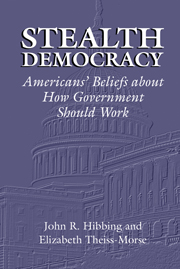Book contents
PART III - SHOULD PEOPLE BE GIVEN THE PROCESSES THEY WANT?
Published online by Cambridge University Press: 23 November 2009
Summary
What we have tried to do so far is understand the political process the people of the United States most prefer, for better or worse, realistic or not. And we now know that Americans do not care much about most policies. They do not like conflict. They do not like special interests. They are not populists. They do not want to be more involved in politics. They do not want to keep a wary eye on self-interested politicians. What they want are caring, other-regarding, common-good-oriented decision makers. They want empathetic, non-self-interested decision makers (ENSIDs).
What do these empirical results mean for our understanding of democracy and how it ought to work in the United States in the early twenty-first century? Part III addresses this question. We should stress that we do not believe government by ENSIDs is feasible (though it is more feasible than those wedded to politics-as-usual imagine). And we should also stress that even if it were feasible, we do not think government by ENSIDs would be a good idea (but perhaps not as bad an idea as those same traditionalists imagine). The problem is that the currently popular alternative strategies for improving people's attitudes toward government are no better, and may actually be worse, than stealth democracy. We critically analyze some of these alternatives, including getting people more involved in volunteer associations and in deliberative democratic settings.
- Type
- Chapter
- Information
- Stealth DemocracyAmericans' Beliefs About How Government Should Work, pp. 161 - 162Publisher: Cambridge University PressPrint publication year: 2002



